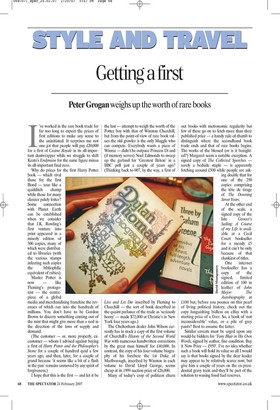Getting a first
Peter Grogan weighs up the worth of rare books 1 've worked in the rare book trade for far too long to expect the prices of first editions to make any sense to the uninitiated. It surprises me not one jot that people will pay £20,000 for a first of Casino Royale in its all-important dustwrapper while we struggle to shift Keats's Endymion for the same figure minus its all-important final zero.
Why do prices for the first Harry Potter book — which rival those for the first Bond — soar like a quidditch champ while those for many classics palely loiter? Some connection with Planet Earth can be established when we consider that J.K. Rowling's first venture into print appeared in a miserly edition of 500 copies, many of which were distributed to libraries (with the various stamps infecting such copies the bibliophilic equivalent of rabies).
Master Potter is now — like Fleming's protagonist — the centrepiece of a global media and merchandising franchise the revenues of which run into the hundreds of millions. You don't have to be Gordon Brown to discern something coming out of the mist that might give more than a nod in the direction of the laws of supply and demand.
(The customer — or, more properly, excustomer — whom I advised against buying a first of Harry Potter and the Philosopher's Stone for a couple of hundred quid a few years ago, and then, later, for a couple of grand because 'it seems like a bit of a flash in the pan' remains unmoved by any spirit of forgiveness.) I hope that this is the first — and let it be the last — attempt to weigh the worth of the Potter boy with that of Winston Churchill, but from the point-of-view of rare book values the old growler is the only Muggle who can compete. Everybody wants a piece of Winnie — didn't he outpace Princess Di and (if memory serves) Noel Edmonds to sweep up the garland for 'Greatest Briton' in a BBC poll just a couple of years ago? (Thinking back to 007, by the way, a first of Live and Let Die inscribed by Fleming to Churchill — the sort of book described in the quaint parlance of the trade as 'seriously horny' — made $72,000 at Christie's in New York four years ago.) The Cheltenham dealer John Wilson currently has in stock a copy of the first volume of Churchill's History of the Second World War with numerous handwritten corrections by the great man himself for £40,000. In contrast, the copy of his four-volume biography of his forebear the 1st Duke of Marlborough, inscribed by Winston in each volume to David Lloyd George, seems cheap at its 1999 auction price of £26,000.
Many of today's crop of politicos churn out books with metronomic regularity but few of these go on to fetch more than their published price — a handy rule-of-thumb to distinguish where the secondhand book trade ends and that of rare books begins. The works of the blessed (or is it benighted?) Margaret seem a notable exception. A signed copy of The Collected Speeches — surely a bedside staple — is apparently fetching around £500 while people are asking double that for one of the 250 copies comprising the tete de tirage of The Downing Street Years.
At the other end of the scale, a signed copy of the late Grocer's Sailing: A Course of my Life is available at a Cecil Court bookseller for a measly £5 and it can't be only because of that clunkiest of titles.
One internet bookseller has a copy of the signed, limited edition of 100 in leather of John Major: The Autobiography at £100 but, before you pounce on this pearl of living political history, check out the copy languishing bidless on eBay with a starting price of a fiver. So, a book of 'not inconsiderable' value, or a pile of grey pants? Best to assume the latter.
Similar caveats must be urged upon any would-be bidders for 'Tony Blair in His Own Words, signed by author, fine condition. Buy it Now Price — £950'. I've no idea whether such a book will hold its value so all I would say is that books signed by the dear leader may appear to be relatively scarce now, but give him a couple of years on the ex-presidential gravy train and they'll be part of the solution to waning fossil fuel reserves.
David Montgomery






















































 Previous page
Previous page